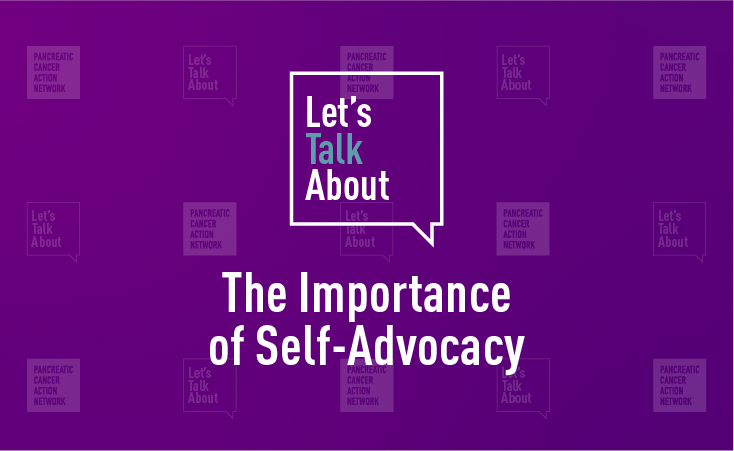
When faced with a diagnosis of pancreatic cancer, it can be difficult to navigate the healthcare system and know how to find the right resources.
These challenges can be magnified for historically marginalized groups who often face systemic racism and discrimination when seeking medical care. Research has shown that bias within the healthcare system leads to unequal access and poorer outcomes.
As healthcare professionals and organizations continue to work to address these complex issues, one way to improve outcomes is to empower patients to advocate for themselves. This is a critical part of the PanCAN Patient Services mission, says Ana Gonzalez, a Patient Services Manager. The goal is to help patients have the confidence to speak up, understand their options and make the choices that work best for them.
The first step is emphasizing to patients and their loved ones that they are in control of their journey, said Ana.
“When we encourage patients to practice self-advocacy, what we mean is we want them to take an active role,” she says. “One of the biggest obstacles – especially for minority groups -- can be knowing that you can have a say. For example, if you’re told something that doesn’t align with your understanding of your disease, your body and your options, you can say, ‘This doesn’t sound right. I should probably get a second opinion.’”
As patients begin to engage in these conversations, they have more agency and take on more decision making.
“Patients hold a lot of power,” she says. “And if they’re equipped with the right tools, they can feel that confidence and that comfort to be an active participant in decisions.”
Here are four ways that PanCAN Patient Services helps patients advocate for themselves as they navigate their pancreatic cancer journey.
1.) Questions to ask at healthcare appointments
“We equip patients with questions to ask doctors when they’re at appointments,” said Ana. “For questions about the diagnosis, treatment options or diet and lifestyle changes, we have a great fact sheet to help guide those conversations. Another fact sheet focuses on how to get organized for appointments, how to seek out a second opinion and other related topics.”
PanCAN strongly recommends discussing treatment goals with a patient’s healthcare team and knowing all the options at every stage of disease.
2.) Connections to pancreatic cancer specialists
PanCAN strongly recommends patients consult with pancreatic cancer specialists who have experience diagnosing and treating the disease, and Patient Services can provide a list of specialists in your area. However, there are limitations to this resource. “There are not many specialists in very rural areas,” Ana said. “A significant population of patients that are diagnosed live in rural areas and some choose to travel in order to see a specialist. I was just speaking to someone yesterday who has to travel five hours for a consultation.”
Understanding the nuances of a patient’s particular situation is important, said Ana.
“We can provide information about specialists that are closest to them. Or, if they have family in another area, in different states, we can take that into account when we’re looking for doctors.”
It’s important to have access to this network as research has shown that consulting a specialist who sees a high volume of pancreatic cancer patients is associated with better outcomes.
3.) Resources related to clinical trials
“Some of the most frequently asked questions and concerns are, ‘What are clinical trials? What type of treatment would I be receiving? Am I going to get a placebo? I don’t want to be experimented on,’” Ana shared.
“These are all common misconceptions. We educate patients about how every approved treatment went through the clinical trials process. It’s a very safe approach to find potentially better treatment options.”
Patient Services case managers can perform a personalized clinical trials search for patients that considerstheir location, specific type and stage of pancreatic cancer, treatment history, as well as any travel preferences.
This resource is especially important for underrepresented groups, as clinical trials – a critical treatment option for pancreatic cancer – historically enroll a low number of patients from diverse populations. Increasing the diversity of clinical trial participants can help researchers find treatments that help more people.
4.) Personalized financial support and resources
PanCAN’s partnership with the Patient Advocate Foundation provides important support for patients who need help with financial and insurance-related obstacles. “We refer patients to the Patient Advocate Foundation through our secure line that is solely for the PanCAN financial navigation program,” said Ana. “Patients will be paired with a case manager that has a specialty in whatever area of assistance they’re looking for.”
That same case manager works with the patient until their issue is resolved, whether it is a question about insurance coverage, billing or finding a state or federal program that can help with medical costs.
“The Patient Advocate Foundation makes sure that there is a complete follow-through related to the patients’ financial and insurance-related challenges, while the PanCAN Patient Services case manager continues to provide disease-related information, resources and support,” she said.















